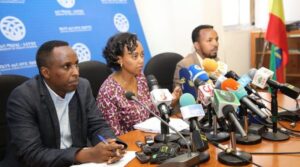Is Ethiopia Transparent about the COVID-19 Situation in the Country?
 |
| Federal Minister of Health (middle)
|
Ethiopia’s latest Notification Note on COVID-19 Situational Update paints the picture of a country that is relatively in good shape and very much in control of the spread of the pandemic across the country: 123 cases and 3 deaths to date. The report also indicates a total of 13,645 laboratory tests carried out. 957 tests were conducted during the past 24 hours, with only one new case confirmed in Jigjiga, the Capital of the Somali Regional State (SRS). These are encouraging numbers. And the temptation to congratulate the leadership of the country, in particular the Minister of Health and her team, is strong, even irresistible.
What We Know about the Coronavirus
What We know about Ethiopia
Conclusion
Hassan Keynan is a former Professor at the Somali National University and a senior retired UN official who worked in Africa, Asia and Europe

